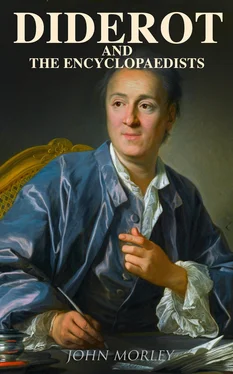Diderot sent a copy of his work to Voltaire. The poet replied with his usual playful politeness, but declared his dissent from Saunderson, "who denied God, because he happened to have been born blind."[72] More pretentious, and infinitely less acute critics than Voltaire, have fixed on the same point in the argument and met it by the same answer; namely, that, blind as he was, Saunderson ought to have recognised an intelligent Being who had provided him with so many substitutes for sight; he ought to have inferred a skilful demiurgus from those ordered relations in the universe, which Thought, independently of Vision, might well have disclosed to him. In truth, this is not the centre of the whole argument. When Saunderson implies that he could only admit a God on condition that he could touch him, he makes a single sense the channel of all possible ideas, and the arbiter of all reasoned combinations of ideas. This is absurd, and Diderot, as we have seen, rapidly passed away from that to the real strength of the position. All the rest of the contention against final causes would have come just as fitly from the lips of a man with vision, as from Saunderson. The hypothetical inference of a deity from the marvels of adaptation to be found in the universe is unjustified, among other reasons, because it ignores or leaves unexplained the marvels of mis-adaptation in the universe. It makes absolute through eternity a hypothesis which can at its best only be true relatively—not merely to the number of our senses, but—to a few partially chosen phenomena of our own little day. It explains a few striking facts; it leaves wholly unexplained a far greater number of equally striking facts, even if it be not directly contradicted by them. It is the invention of an imaginary agency to account for the scanty successes of creation, and an attribution to that agency of the kind of motives that might have animated a benevolent European living in the eighteenth century. It leaves wholly unaccounted for the prodigious host of monstrous or imperfect organisms, and the appalling law of merciless and incessant destruction.
To us this is the familiar discussion of the day. But let us return to the starting-point of this chapter. In France a hundred and twenty years ago it was the first opening of a decisive breach in the walls that had sheltered the men of Western Europe against outer desolation for some fifteen centuries or more. The completeness of Catholicism, as a self-containing system of life and thought, is now harder for Protestants or Sceptics to realise, than any other fact in the whole history of human society. Catholicism was not only an institution, nor only a religious faith; it was also a philosophy and a systematised theory of the universe. The Church during its best age directed the moral relations of individual men, and attempted, more or less successfully, to humanise the relations of communities. It satisfied or stimulated the affections by its exaltation of the Virgin Mary as a supreme object of worship; it nourished the imagination on polytheistic legends of saints and martyrs; it stirred the religious emotions by touching and impressive rites; it surrounded its members with emblems of a special and invincible protection. Catholicism, we have again and again to repeat, claimed to deal with life as a whole, and to leave no province of nature, no faculty of man, no need of intelligence or spirit, uncomprehended. But we must not forget that, though this prodigious system had its root in the affections and sympathies of human nature, it was also fenced round by a theory of metaphysic. It rested upon authority and tradition, but it also sought an expression in an intellectual philosophy of things. The essence of this philosophy was to make man the final cause of the universe. Its interpretation of the world was absolute; its conception of the Creator was absolute; its account of our intellectual impressions, of our moral rules, of our spiritual ideals, made them all absolute. Now Diderot, when he wrote the Letter on the Blind, perceived that mere rationalistic attacks upon the sacred books, upon the miracles, upon the moral types, of Catholicism, could only be partially effective for destruction, and could have no effect at all in replacing the old ways of thinking by others of more solid truth. The attack must begin in philosophy. The first fruitful process must consist in shifting the point of view, in enlarging the range of the facts to be considered, in pressing the relativity of our ideas, in freeing ourselves from the tyranny of anthropomorphism.
Hobbes's witty definition of the papacy as the ghost of the old Roman Empire sitting enthroned on the grave thereof, may tempt us to forget the all-important truth that the basis of the power of the ghost was essentially different from that of the dissolved body. The Empire was a political organisation, resting on military force. The Church was a social organisation, made vital by a conviction. The greatest fact in the intellectual history of the eighteenth century is the decisive revolution that overtook that sustaining conviction. The movement and the men whom we are studying owe all their interest to the share that they had in this immense task. The central conception, that the universe was called into existence only to further its Creator's purpose towards man, became incredible. This absolute proposition was slowly displaced by notions of the limitation of human faculties, and of the comparatively small portion of the whole cosmos or chaos to which we have reason to believe that these faculties give us access. To substitute this relative point of view for the absolute, was the all-important preliminary to the effectual breaking up of the great Catholic construction.
What seems to careless observers a mere metaphysical dispute was in truth, and still is, the decisive quarter of the great battle between theology and a philosophy reconcilable with science. When the Catholic reaction set in, Joseph de Maistre, by far its acutest champion in the region of philosophy, at once made it his first business to attack the principle of relativity with all his force of dialectic, and to reinstate absolute modes of thinking, and the absolute quality of Catholic propositions about religion, knowledge, and government.[73] Yet neither he nor any one else on his side has ever effectively shaken the solid argument which Diderot fancifully illustrated in the following passage from his reply to Voltaire's letter of thanks for the opuscule: "This marvellous order and these wondrous adaptations, what am I to think of them? That they are metaphysical entities only existing in your own mind. You cover a vast piece of ground with a mass of ruins falling hither or thither at hazard; amid these the worm and the ant find commodious shelter enough. What would you say of these insects, if they were to take for real and final entities the relations of the places which they inhabit to their organisation, and then fall into ecstasies over the beauty of their subterranean architecture, and the wonderfully superior intelligence of the gardener who arranges things so conveniently for them?"[74] This is the notion which Voltaire himself three years afterwards illustrated in the witty fancies of Micromégas . The little animalcule in the square cap, who makes the giant laugh in a Homeric manner by its inflated account of itself as the final cause of the universe, is the type of the philosophy on which Catholicism is based.
In the same letter Diderot avows his dissent—hypocritically, we find reason for suspecting—from Saunderson's conclusion. "It is commonly in the night-time," he says, "that the mists arise which obscure in me the existence of God; the rising of the sun never fails to scatter them. But then the darkness is ever-enduring for the blind, and the sun only rises for those who see." Diderot's denial of atheism seems more than suspicious, when one finds him taking so much pains to make out Saunderson's case for him, when he urges the argument following, for instance: "If there had never existed any but material beings, there would never have been spiritual beings; for then the spiritual beings would either have given themselves existence, or else would have received it from the material beings. But if there had never existed any but spiritual beings, you will see that there would never have been material beings. Right philosophy only allows me to suppose in things what I can distinctly perceive in them. Now I perceive no other faculties distinctly in the mind except those of willing and thinking, and I no more conceive that thought and will can act on material beings or on nothing, than I can conceive material beings or nothing acting on spiritual beings." And he winds up his letter thus: "It is very important not to take hemlock for parsley; but not important at all to believe or to disbelieve in God. The world, said Montaigne, is a tennis-ball that he has given to philosophers to toss hither and thither; and I would say nearly as much of the Deity himself."[75]
Читать дальше












